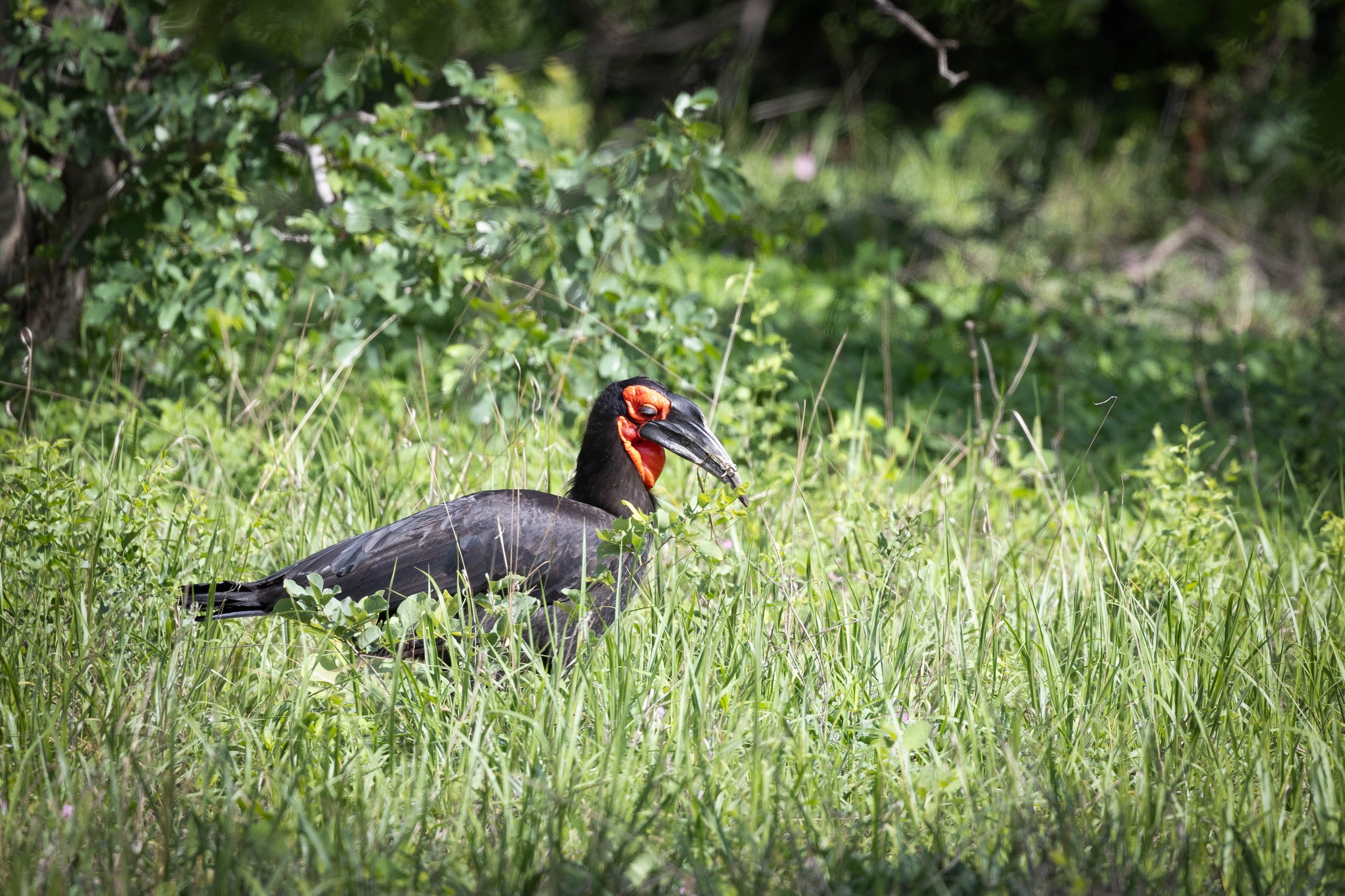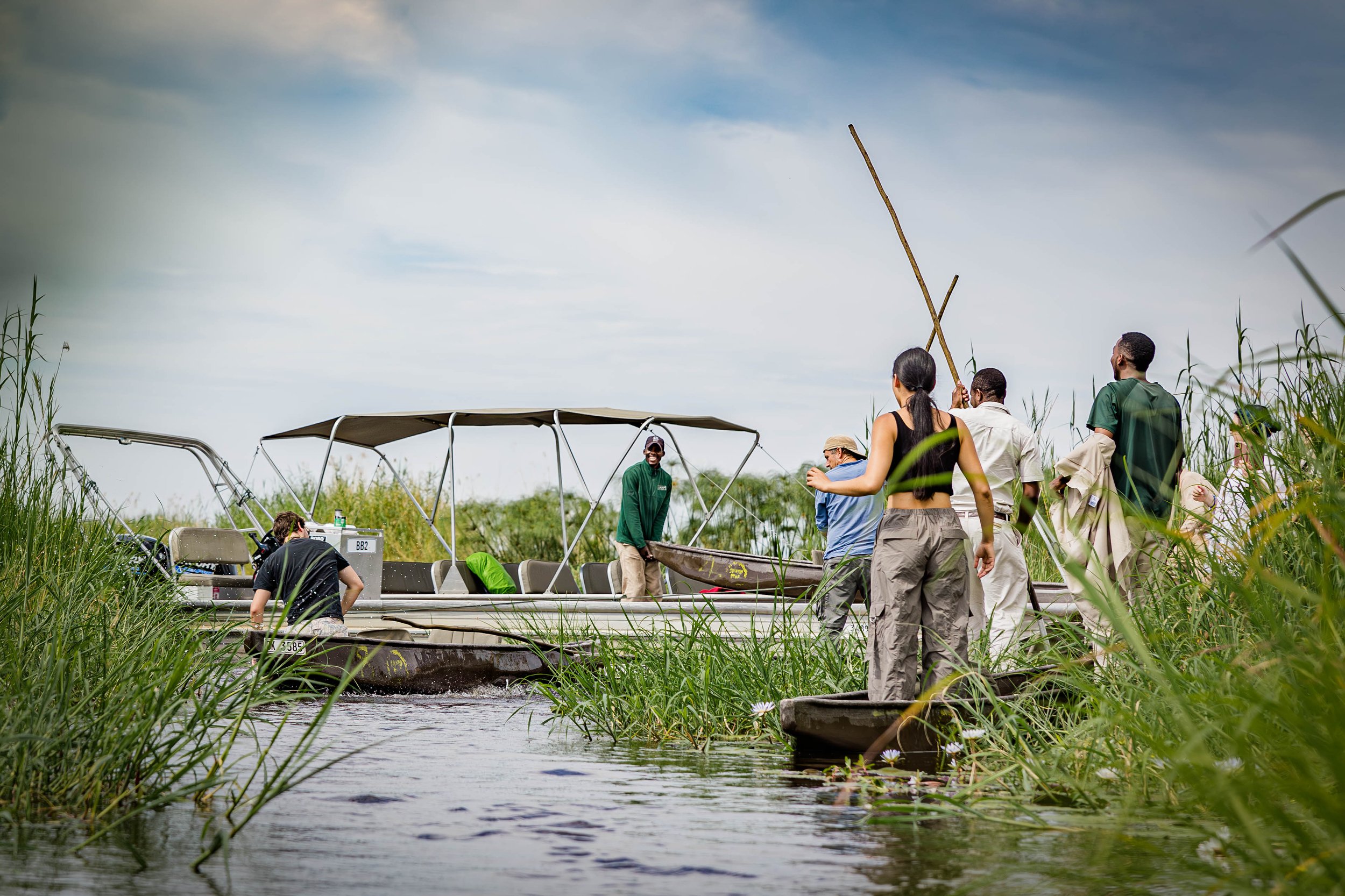Botswana
We cross into Botswana on New Year’s Eve, the group has changed a little for the next leg of our journey to Cape Town. We’ve said goodbye to four Australian’s, one English and the El Salvadorian and welcomed three new Australians so our group is now half Swiss and Australian. It is a 4:30 AM start on New Year’s Day for a dawn game drive so none of us managed to stay awake till midnight. Chobe National Park is unfenced and there a lot of elephants in the bushy park, the last remaining rhino have been moved to a more secure location. There’s rare ground hornbills and a lone young male lion sits by the side of the road calling for the rest of the pride. The elephants move in a large herd past the safari Land Cruiser, it’s great to see these huge animals up close, covered in the red soil to stay cool.


















The upmarket camp site lodge is on the corner of Zambia, Zimbabwe, Botswana and Namibia where the two main rivers converge. It has plenty of wildlife here too, a mob of blue balled Vervet Monkeys search for bar snacks whilst avoiding catapult armed security guards, hippos wallow just off shore and a family of warthogs snaffle fallen figs in the campsite. An English couple, motorbiking their way down to Cape Town, have to rescue their tent as the warthogs sniff out a couple of mangoes, managing to somehow eat them through the mesh liner leaving just the stone in the tent pocket.
During the colonial times the German government wanted access to the Zambezi river from Namibia towards east Africa in hope of reaching the colonies in Tanzania. They traded Zanzibar with the British for a section of land of Botswana and a small island of Helgoland near Germany. However the river turned out to be unnavigable and unlike the British, they did not know about Victoria Falls preventing any further transport upstream. Today this strip of land is known as Caprivi and has a long straight road and little else. We didn’t see any elephants or the African wild dogs that transit the area, John pointed the truck south west for four hours with barely a curve. We break by the side of the road for Ken’s roadside kitchen, Martina finds it amazing what he can do with just two burners, especially after struggling with fresh supplies in Zimbabwe.









The next day we leave Namibia again to go back to Botswana and on to the Okavango Delta. Unlike most rivers the Okavango doesn’t reach the sea, instead it flows into a huge wetland where forty percent of the water evaporates and the rest slowly seeps underground to reappear elsewhere as oasis’s in the desert. As we await for our boats to the bush camp deep in wetlands a huge storm blows through. It seemed that we would have to overnight on the mainland but it eases off and we can travel onwards. All the kitchen and camping equipment leaves in one boat and we take another for a scenic trip to the bush camp.
The Okavango Delta supports a rich variety of fauna and flora, there are nile crocodiles hiding by the waters edge, cranes, giant kingfishers, and a pair of African fish eagles perch atop a tree. After setting up camp we head back out in the boat to explore the smaller channels carved out of the wetlands by the hippos.
Hippos can be very aggressive, they will charge and capsize boats that come close to their territory, their huge sharp teeth can puncture the hull of the boat and they have the strongest bite of any animal. We round one corner in the channel and a family of hippos are blocking the way and are keen defend their patch, baring their teeth with a huge open gape and snorting. They attack by submerging, walking along the bottom of the lake leaving a tell tale sign of bubbles as they approach, and launching back up to attack. The boatswain backs off as the hippo emerges again close to where the boat had been, the only way past is to use full speed and charge past leaving them angrily snapping in our wake. More than once, as the boat quickly weaves its way through the wetlands, a hippo emerges in front of the boat and we go straight over it.













As the sun sets we head back to our bush camp, a log fire burns in the centre as Ken prepares dinner. There are no facilities here, just a hole with a loo seat over it and a spade. Apparently that is also where the hippos like to roam at night. I awake in the tent as lightning flashes overhead, I can hear the hippos calling to each other across the camp in their low rumble laugh. As they munch the grass next to the tent I think back to how they can bite through a steel boat and wonder how I am safe, cowering in the canvas and mesh tent, feeling like my head is just inches from its huge mouth. I don’t dare to sit and peek through the mesh in case I suddenly illuminated by a lightning flash in front of a hippo. After what feels like hours, they eventually splash loudly into the river behind and move away. The rain lashes down and I search the area with a torch before lowering the flaps of the tent. We both pee by torchlight in the bush nearby, not wanting to venture over to the spade and hole.
The morning reveals fresh dung by the tents where the hippos had been. We have a trip planned in Makoras, these pole driven flimsy fibreglass replicas of the wooden dugout canoe offer no protection against a hippo, but our boat puller insists that they can keep their distance from them in the shallow waters where they cannot hide. The canoe holds the two of us, the boat puller, and Martina’s camera bag, it’s not waterproof and unlikely to float, but we stay dry as we head through the narrow channels. There are paths through the water lilies and papyrus reed beds that the hippos have made. It’s peaceful on the water and there are both the nighttime and daytime lilles in the shallow waters. As the day heats up and the clouds dissipate the night time lilies close their flowers and the day time open up fully. Once we return to our starting point, and expensive camera kit safely stowed, I try my hand at pulling the boat. The puller sits in the middle and I take the pole and push off. It’s essentially the same technique as punting in Oxford and as there is a loud splash as the Australian on the other canoe falls in for the second time, the boat puller remarks that I have done this before. I have, but not for many years, and the main secret is that the pole is also the rudder for the boat to keep it steady and straight.















We leave Botswana again the next day back over the Namibian border post and our guide Erellah says this the most difficult one. For us it is fairly easy and without visa fees but there are issues with the payment of the truck and its paperwork. On the way in he had to leave us and pop back to town to get cash as they refused cards and other currencies and found fault with his paperwork although everything was cleared. This time it goes a little smoother and the staff member who was difficult is not present. We have two weeks travel though Namibia and will be visiting deserts, the San people, and coastal regions before finishing this leg in Cape Town.


